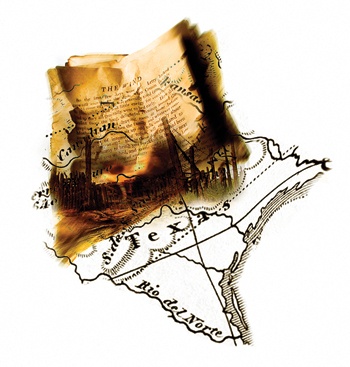The historical landscape of West Texas is littered with colorful tales of remarkable deeds and doers, the rise of down-and-outers to mega fortune, local folks who have gone on to celebrity status in endeavors ranging from White House politics and movie stardom to evildoers and the lawmen who pursued them.
By best account, however, there’s been but one book burning.
It is said to have occurred in 1925 after a gifted and gentle Texas author and educator named Dorothy Scarborough wrote a novel that on one hand earned her national applause and on the other received scathing response from the community leaders of the town in which her book was set.
First published anonymously, The Wind told of a teenage orphan from Virginia who arrived in Sweetwater in the drought-plagued 1880s to live with her cousins, only to be slowly driven to insanity, murder and finally suicide by the bleak, wind-blown world into which she’d settled. As the Mount Carmel-born Scarborough wrote: “The Wind was the cause of it all. The sand, too, had a share in it, and human beings were involved, but The Wind was the primal force …”
So powerful and successful was the novel that it was judged one of the best that year and was later made into in a well-received silent film starring the legendary Lillian Gish. None of this impressed the folks in Sweetwater, where Scarborough had spent several years of her childhood.
Reacting to the fact the book had been published anonymously, the first wave of local outrage suggested that some ignorant Eastern hack had written the melodramatic novel. Angry letters were sent to the publisher and newspapers throughout Texas, blasting The Wind and its author who apparently had lacked the courage to assign his or her name.
Leading the assault was Judge R.C. Crane, a Sweetwater civic leader and founder of the West Texas Historical Association. He insisted that its author had fallen woefully short of an honest portrayal of his hometown and its history—not to mention that The Wind hardly blew as much as the book suggested.
And then, angered locals who had purchased the book gathered in front of the Nolan County Courthouse and set their copies aflame.
You can’t buy that kind of publicity. And releasing the book without the author’s name had worked like a charm. Sales boomed, and a second printing was soon ordered. This time, however, the book bore Dorothy Scarborough’s name.
Well before the second printing, she had written a firm, polite response to Crane. According to an article written by Dr. Sylvia Grider in the 1986 West Texas Historical Association Year Book, Scarborough methodically refuted the judge’s criticisms, finally asking, “Has the West Texas wind got on your nerves, Mr. Crane, and the sand blinded you to the difference between a novel and a historical treatise?”
Grider, a long-time Scar-bor-ough scholar, writes that the author’s response, published in The Dallas Morning News, was an icebreaker. At the height of her book’s success, she was invited to Sweetwater to speak. In a classic bit of irony, the author arrived during of one of the most vicious sandstorms the region had experienced in years. And when she accepted Crane’s invitation to tour the countryside, they were caught in a blue norther so severe that it made their return to town difficult. If Scarborough hadn’t already won her battle with the judge, she did so when she presented him a signed copy of The Wind. By trip’s end, Grider writes, “Scarborough’s visit to Sweetwater turned out to be a triumphal tour.”
Though still considered by many scholars as one of the premier Texas novels ever written, The Wind is now but a whisper on the literary landscape. Its last publication was a paperback edition 20 years ago. (It’s available online on sites such as Alibris.com.) Yet there is little question Scarborough pointed the way for the modern-day likes of Larry McMurtry and Cormac McCarthy.
She taught literature and creative writing at Baylor University, where she’d earlier earned her bachelor’s (and later an honorary doctor of literature degree), and at Columbia University, where she earned a doctorate. She also studied at Oxford University. And though none of her other books created the stir of The Wind, she continued to write. The theme of her fiction and nonfiction, short stories and poetry, generally focused on the plight of early day Texas women.
Although she called New York home in the years before her death in 1935, Scarborough made one final trip back to Texas. She is buried in Waco’s Oakwood Cemetery, where, it is said, The Wind only gently blows.
——————–
Carlton Stowers is a frequent contributor to Texas Co-op Power. Two of his nonfiction best-sellers, To the Last Breath and Careless Whispers, won the Mystery Writers of America’s Edgar Allan Poe Award.


